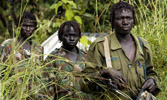
KAMPALA, Uganda — Sam Kolo, once known as a high-ranking commander and spokesperson for the Lord’s Resistance Army, or LRA, graduated from Gulu University last week with a degree in business administration. In an interview with the Ugandan Daily Monitor after the ceremony, Kolo said he regrets that so many of his former comrades remain in the bush. “We would be jubilating with them,” he said.
Sam Kolo was a key figure in the 2005 peace negotiations between the LRA and the Ugandan government. He abandoned the rebel group in February 2005, reportedly due to disagreements with other top LRA commanders about how to conduct the peace negotiations. The Ugandan government granted him amnesty, and Kolo later provided valuable intelligence to the Ugandan army in their hunt for Joseph Kony, the long-time leader of LRA. Now a university graduate, Sam Kolo said he wishes to settle with his family. He told the Ugandan Daily Monitor he chose to study business because, “The world is built on business and needs people with business minds to help it prosper.”
The successful reintegration of Sam Kolo serves as a sharp contrast to the ongoing trial against Thomas Kwoyelo, a former member of LRA who claims the group abducted him when he was 13 years old. Kwoyelo also applied for amnesty, but the Ugandan government has refused to grant it. On the contrary, he was charged with 53 counts of murder and is held in prison, despite a ruling from Uganda’s Constitutional Court that he should be set free and granted amnesty.
The Amnesty Act came into effect in 2000 and gives amnesty to all ex-LRA that renounce and abandon the rebellion. The law makes an exception, however, for the top leaders, who are facing changes of war crimes and crimes against humanity at the International Criminal Court, or ICC.
Uganda’s amnesty law has proven a powerful tool for encouraging defections of LRA fighters, but it could quickly be undermined—and may have been already to some degree as the Kwoyelo trial labors on. The Ugandan government and international partners working toward ending the LRA must be pragmatic: Opening up further prosecutions and punishment can easily prevent both higher and lower ranking LRA from coming out of the bush. Further, the case for amnesty, reconciliation, and forgiveness has always been very strong among politicians, community leaders, and civilians in northern Uganda.
Like the U.S. deployment of military advisors to countries affected by the LRA, the amnesty law is a crucial part of a range of efforts aimed at increasing military and civil pressure to end the LRA. Defectors must be granted amnesty and given the opportunity—like Sam Kolo—to become members of society. Without amnesty, they are unlikely to attempt a risky escape from the LRA.
Photo: LRA fighters (AP)

